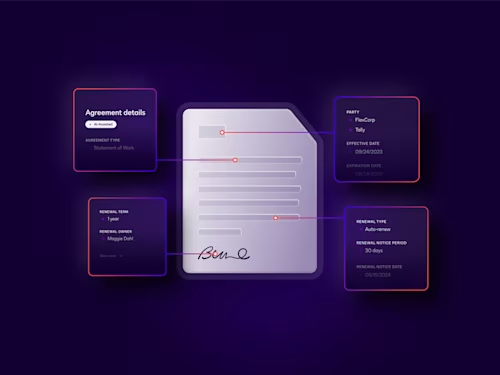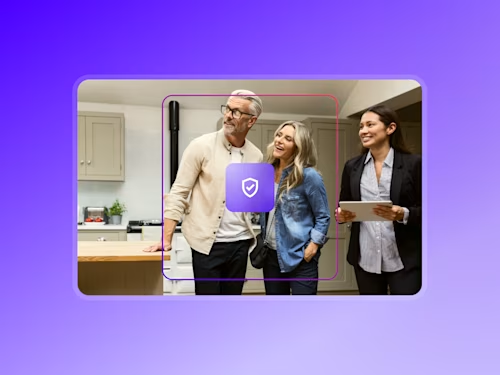
Boost Productivity with Workflow Automation
Digitizing, streamlining and integrating the entire agreement workflow can help boost productivity, cut unnecessary costs and mitigate risks.

Organizations run on agreements, and they’re truly everywhere.
Whether hiring staff, selling products or signing a corporate policy, agreements formalize all kinds of business transactions. And because they form the foundations of business processes and customer, employee and partner relationships, they can significantly impact the bottom line.
However, many agreement workflows are highly complex and manual. Think about the steps it takes to complete a critical sales agreement. You first must prepare and draft a contract review, negotiate the terms and then obtain multiple internal and external approvals—all before signing the agreement. Any delays add frustration and possibly jeopardize the deal.
It’s a widespread problem. According to Forrester Consulting, 9 out of 10 organizations struggle with manual agreement processes. They found that 48% of respondents had delays due to errors and missing info, 42% identified poor customer experience and 39% saw delays in routing and obtaining signatures in the correct order.
As these statistics show, if organizations neglect to automate their manual agreement processes, they're sacrificing cost, efficiency and quality. It’s true that many organizations have started modernizing their agreement processes by adopting e-signature. That’s a great first step, but the agreement process extends beyond just signing. It can be broken down into three main stages: prepare, sign and act.
Organizations should look at the entire agreement cycle from end to end instead of as a disconnected process. Digitizing, streamlining and integrating the entire workflow can help boost productivity, cut unnecessary costs and mitigate risks.
Digitizing your agreement workflow in three acts
To illustrate the power of digitizing the entire agreement workflow, let’s use an example from within the HR organization and follow it through all three key stages.
1. Prepare
Starting with the agreement preparation stage, HR teams can save time and create better signer and employee experiences with the help of powerful Docusign applications and features like Document Generation, Bulk Send and Shared Access.
Among the most common documents used by HR teams are offer letters. While much of the content in these agreements is standardized, recruiters need to insert customized details such as the candidate’s name, job title and start date before it can be sent for signature. Sometimes, they must also insert customized clauses, such as bonus terms, that differ based on job titles.
Manually inserting these details in each document is time-consuming, especially during high-volume periods. And using pre-fill fields to insert this information can lead to unexpected formatting issues, resulting in a less-than-professional image and costly delays.
With Document Generation, recruiters can generate personalized, professional agreements directly within Docusign eSignature. The sender can provide the required information for each agreement within the sending workflow, which is then dynamically inserted into the original document. Users may also set up conditional rules within the template to hide or display content based on the data inserted.
In those cases where an HR team needs to send out hundreds of agreements simultaneously, the Bulk Send feature allows you to dynamically insert personalized information into each agreement and send them out in a well-formatted and professional way.
Using the Bulk Send feature with Document Generation helps HR teams decrease the time it takes to create and send documents to multiple recipients, reducing administrative inefficiencies and errors and improving the user experience for both recipients and senders.
Lastly, the Shared Access feature allows HR reps to easily provide another user with permission to send and/or manage envelopes on their behalf, helping to remove bottlenecks in the agreement process. And now, the latest enhancement to Shared Access allows users to send on behalf of others using built-in templates, including those compatible with Document Generation.
2. Sign
While some eSignature workflows are very straightforward, others are more complex, involving multiple signers, routing steps and approvals.
Through Conditional Routing, HR teams can streamline these complex routing scenarios by setting up conditional business rules in a no-code environment. This allows an envelope to be dynamically routed to different users based on the field data inserted.
For example, a recruiter can set up a rule that automatically sends offers containing bonus terms over 30% to the hiring manager and any bonus term over 50% to the VP for approval.
With Conditional Routing, HR teams can save time while accelerating agreement turnaround.
And to ensure compliance, Conditional Routing logs all routing approval and signature activities, creating an audit trail.
3. Act
The agreement lifecycle doesn’t end at eSignature.
Once the agreement is signed, HR teams often must perform follow-up tasks like storing the document, uploading it into the system of record and initiating downstream actions like sending out onboarding documents. Typically, such actions are performed manually and may be time-consuming, error-prone or reliant on specialists with technical expertise.
To make managing these post-signature actions easier, HR teams can leverage Agreement Actions, a no-code automation tool that helps save time by automating post-signature tasks with clicks, not code.
Agreement Actions automates a series of post-signature actions, including:
Archiving agreements to a preferred cloud storage provider like SharePoint, Box or Google Drive
Sending the next envelope once an agreement is completed
Exporting data from the agreements into a spreadsheet for easy analysis
Triggering a workflow within Docusign CLM (contract lifecycle management)
For example, a recruiting team can set up Agreement Actions so that once an offer letter is completed, it will be archived in the appropriate Google Drive folder, and the next envelope containing the onboarding package will be automatically sent out to the candidate.
Tying it all together
For those organizations looking to take the next step in their digital transformation journey, the eSignature REST API is just the ticket. This powerful integration tool has taken the most common user actions within eSignature and made them available for users to access independently.
By tapping into the API, eSignature users can take these components and build unique processes that can scale to meet future needs. Whether automating the collection of new employee onboarding documentation directly from a mobile app or taking data from business-critical third-party applications and triggering internal eSignature workflows, Docusign APIs allow organizations to accelerate their digital transformation journey.
Organizations truly run on agreements, but many still rely on manual customization, multiple signers or parallel downstream tasks.
Ready to get started? Learn how workflow automation with eSignature can eliminate redundant work for your most complex documents.
Related posts
Docusign IAM is the agreement platform your business needs


